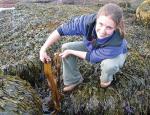Melinda's kelp is on its way
 Environmental Biology Environmental Biology
Dr Melinda Coleman, joining the School of Earth and Environmental Sciences in 2006, is an early career researcher who has just been awarded her first Australian Research Council grant, worth $335,000 over four years, to study gene flow of the seaweed, Ecklonia radiata. Ecklonia radiata, also known as common kelp, is the species that we see in piles along the beach in large quantities after storms. It forms extensive "forests" on subtidal reefs along much of the temperate Australian coast and is the most common seaweed found in Australian waters. Dr Coleman has a PhD from the University of Sydney, and has just returned from a three year post-doctoral fellowship at the University of Maine in the School of Marine Sciences. Whilst there, she learnt new genetic techniques which, when combined with her strong ecological background, will be used to test novel ecological hypotheses on dispersal and gene flow in habitat-forming algae. Her project will look at Ecklonia radiata populations around the temperate coast of Australia, examining to what extent populations are connected by looking at variability in specific portions of their genetic material. Dr Coleman's research will also use ecological experiments to look at how far the reproductive output (eggs, sperm, spores, etc) travel, to see if populations are isolated or connected. This detailed study of seaweed may seem obscure, but Ecklonia radiata is an important habitat for an extraordinary diversity of sea creatures ranging from invertebrates through to commercially important species of fish. The knowledge gained from this research will have important implications for the understanding of marine biodiversity and also for industries like commercial fishing. Dr Coleman said investigating how these very important habitats persist in nature is critical if we are to effectively conserve and manage our marine environment. "There are only a few published papers at the moment that look at dispersal and gene flow of seaweed species in Australia and they're done on very small spatial scales. This will be the first major study," Dr Coleman said. "I will travel right around the temperate coast of Australia examining the connectivity between seaweed populations. It's a novel and exciting project and I can't wait to get started." Story by Lisa Reid
|





